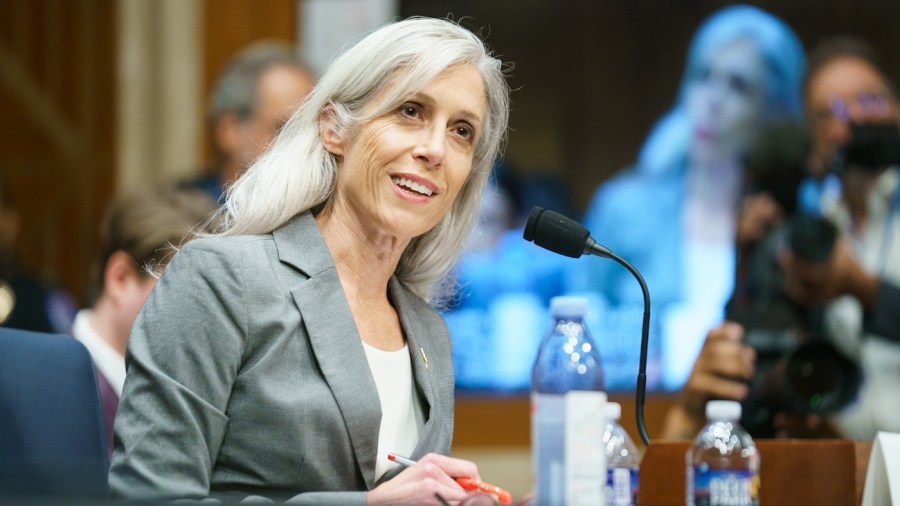Susan Monarez testified for more than three hours Wednesday about her ouster as head of the Centers for Disease Control and Prevention (CDC) after less than a month on the job, accusing Health and Human Services Secretary Robert F. Kennedy Jr. of putting politics over public health and endangering the country.
Monarez, the first Senate-confirmed CDC director, told members of the Senate Health Committee that Kennedy pressured her and other officials to support unethical changes to federal vaccine policy without supporting evidence, bypassed the agency’s scientific process by announcing major decisions on social media, and prohibited them from talking to lawmakers.
“I was fired for holding the line on scientific integrity,” Monarez said, adding she was “concerned about my ability to continue leading the CDC while preserving evidence-based decisionmaking.”
Here are key takeaways.
Changes to the childhood vaccine schedule
Committee Chair Bill Cassidy (R-La.) asked Monarez whether Kennedy spoke about the childhood vaccine schedule.
Monarez testified that Kennedy told her the childhood vaccine schedule would change starting in September, “and I needed to be on board with it.”
Monarez also said Kennedy told her that “he spoke to the president every day about changing the childhood vaccine schedule.”
Kennedy is a longtime vaccine skeptic who has promoted false information about the harms of vaccines. He committed to senators during his confirmation hearing that he supports the childhood vaccine schedule.
But an influential panel of CDC vaccine advisers Kennedy handpicked is scheduled to meet Thursday and Friday to review — and likely change — recommendations for hepatitis B vaccines for infants after birth.
The hepatitis B vaccine has been credited with saving tens of thousands of lives since physicians began administering it at birth more than 30 years ago.
A spokesperson for the Department of Health and Human Services (HHS) pushed back on the notion that Kennedy has already decided to change the childhood vaccine schedule.
“The upcoming ACIP meeting will decide the outcome,” the spokesperson said, referring to the Advisory Committee on Immunization Practices. “Any potential changes to the childhood vaccine schedule will be based on the latest available science and only after the ACIP recommends it and the acting CDC director reviews and approves those recommendations.”
Monarez said Kennedy told her to commit in advance to approving every recommendation from the panel, “regardless of the scientific evidence.”
Jim O’Neill, a deputy Health and Human Services secretary with a background in tech investing, is now the acting CDC director.
Kennedy bypassed or ignored scientific experts
Debra Houry, the CDC’s former chief medical officer, testified that Kennedy has bypassed or ignored scientific experts.
When he changed the recommendations on COVID-19 vaccinations for healthy children and pregnant women, Houry said she found out when Kennedy posted it on social media.
“After the tweet came out, we asked for a written memo from HHS because I couldn’t implement guidance off of a tweet,” Houry said. She added she still has not seen the data used to justify the change.
Houry also said she never briefed Kennedy about the agency’s measles response.
“In an outbreak response, usually you would be briefing leadership. He also said things like vaccines had fetal parts, and I had to send a note to our leadership team to correct that misinformation,” Houry said.
Houry, who later said Kennedy should resign, added that none of the agency’s center directors have briefed the secretary.
Monarez and Houry said key policy decisions were not being made by career scientists but instead by Kennedy’s political staff. Houry specifically named Kennedy’s aide Stuart Burns as helping draft the agenda for the ACIP meetings.
Burns is a veteran House GOP aide who is now a special adviser at the CDC. He spent decades working for Republicans known for their anti-vaccine views, including former Florida Rep. Dave Weldon — Kennedy’s first pick for CDC director whose nomination was withdrawn by the White House.
GOP senators seek to undermine Monarez
Republican senators allied with Kennedy accused Monarez of lying, and some grilled her on her choice of legal representation: prominent D.C. attorneys and Trump critics Mark Zaid and Abbe Lowell.
“I think you might have an honesty issue here that we want to point out,” Sen. Markwayne Mullin (R-Okla.) said.
Mullin suggested there was a recording of the meeting between Monarez and Kennedy that would prove her wrong. Cassidy and Sen. Bernie Sanders (I-Vt.) questioned why only one committee member seemed to have received the tape, and Mullin later said he was mistaken.
Sens. Jim Banks (R-Ind.) and Ashley Moody (R-Fla.) attacked Monarez for her choice of attorneys, implying she coordinated with “anti-Trump lawyers.”
“Of the thousands of lawyers that you could hire to help you through this process, why Mark Zaid?” Banks asked. “You don’t seem naive at all. You have to know that Mark Zaid is a leading opponent of President Trump, notorious for his online activity that is very anti-Trump … why did you hire a guy like that of all the thousands of attorneys?”
“Did you plan to coordinate this public spectacle surrounding your firing?” Moody asked, noting that Monarez called Cassidy after Kennedy initially attempted to push her out.
The questioning was amplified by the official HHS and White House rapid response social media accounts.

